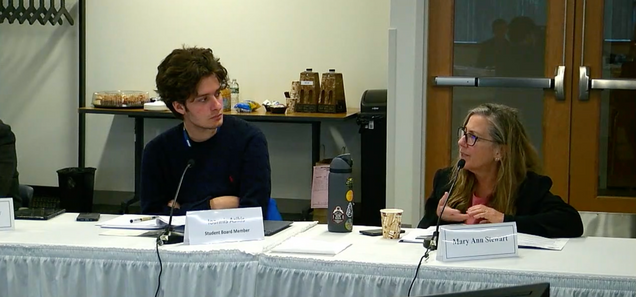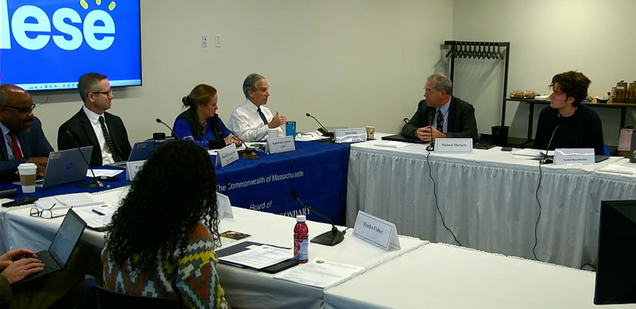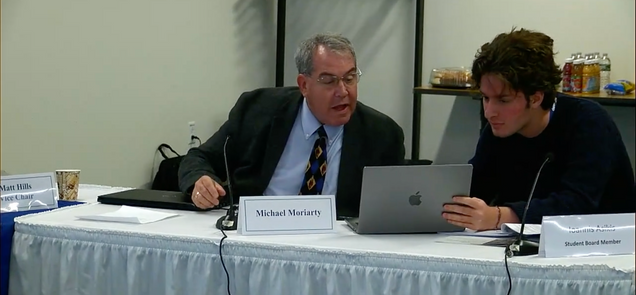News
BUA Alum Returns to Alma Mater to Coach MUN Team
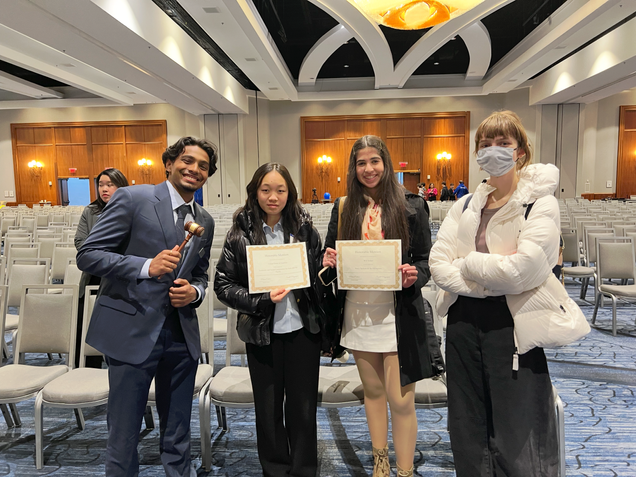 Congratulations to our 14 Model UN delegates who attended last weekend's Boston Model United Nations (BosMUN) XXIV conference!
Congratulations to our 14 Model UN delegates who attended last weekend's Boston Model United Nations (BosMUN) XXIV conference!
This year’s BosMUN was the largest ever, with more than 2,500 delegates from domestic and international high schools. Clair '28 and Nikki '27 both earned third place in their respective committees, The Economic and Social Committee for Asia and the Pacific, and Percy Jackson & the Olympians Crisis Committee, respectively.
Alum Ajay Raman '23 coaches BUA's Model UN team and is an instrumental member of the event Secretariat. On contributing to his alma mater in this capacity, Ajay reflects:
Coaching the BUA Model UN team has been an amazing journey for me, both personally and professionally. Returning to my old high school has given me the opportunity to give back to the community that shaped who I am, and it's been a joy to share my passion for Model UN with a new group of curious students. Watching the students grow, learn, and even win Best Small Delegation at ClarkMUN last year truly reminds me why I wanted to give back to BUA by sharing something I love.
Special thanks to Coach Raman for his ongoing commitment to BUA, as well as to Zeke '25 and Georgie '26 for all the organizational work that went in to ensuring that this year's BosMUN event ran smoothly!
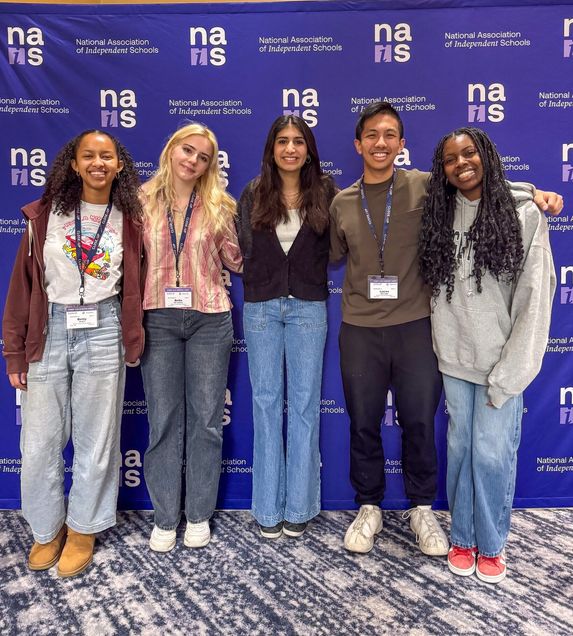
Students Attend DC Civic Leadership Summit
 On February 4, a cohort of six BUA students and two chaperones traveled to Washington, DC, to attend the Close Up Foundation and NAIS’ Student Civic Leadership Summit. Under the guidance of program instructors, Betty '26, Bella '25, Reeya '26, Lucas '25, Angelique '26, and Lani '26 considered a variety of viewpoints on pressing current issues, learned best practices in community engagement, and continued building the skills of citizenship.
On February 4, a cohort of six BUA students and two chaperones traveled to Washington, DC, to attend the Close Up Foundation and NAIS’ Student Civic Leadership Summit. Under the guidance of program instructors, Betty '26, Bella '25, Reeya '26, Lucas '25, Angelique '26, and Lani '26 considered a variety of viewpoints on pressing current issues, learned best practices in community engagement, and continued building the skills of citizenship.
BUA Senior Yiannis Asikis ’25 Serves as Student Representative on MA Board of Education
 As the sole student representative and a full voting member on the Massachusetts Board of Elementary & Secondary Education (BESE), BUA senior Yiannis Asikis has an outsize impact on shaping the future of education in the Commonwealth.
As the sole student representative and a full voting member on the Massachusetts Board of Elementary & Secondary Education (BESE), BUA senior Yiannis Asikis has an outsize impact on shaping the future of education in the Commonwealth.
The mission of BESE is to strengthen Massachusetts’ public education system so that every student is prepared to succeed in postsecondary education, compete in the global economy, and understand the rights and responsibilities of American citizens. Through his work on the Board, Yiannis represents the voices and opinions of all 896,103 K-12 students in public, private, and parochial schools in Massachusetts, and serves as a liaison from the Board to the State Student Advisory Council (SSAC).
Yiannis earned his role on the BESE Board through his work on the SSAC, an organization comprised of student representatives chosen by their peers to help make decisions about state educational policy and student rights. Every secondary school in Massachusetts can send two delegates to their regional advisory council, with the state divided into five regional councils. From there, representatives are elected to serve on the State Student Advisory Council (SSAC). Yiannis first learned about SSAC through an internship at the Massachusetts State House in the summer of 2023 and brought the opportunity to BUA’s attention. His peers at BUA selected him as a delegate for the Greater Boston Regional Student Advisory Council (GBRSAC), where he was later elected to represent the region on SSAC. This year, Sofia Shih '26 serves alongside Yiannis as BUA’s representatives on the Greater Boston Regional Council. In the 2024-2025 school year, Yiannis’s fellow members on the State Student Advisory Council elected him to serve as its Chair, which automatically entitles him to a seat on the Board of Elementary & Secondary Education.
Massachusetts is one of only six states, in addition to Washington, DC, to grant their student representatives full voting powers on its Board of Elementary & Secondary Education, and is one of just 20-30 states nationwide to include student representation. The Board's responsibilities include approving learning standards; voting on charter school applications; deciding when to intervene in the state's lowest-performing districts; and hiring the commissioner. In addition to a student representative, The MA BESE Board includes the Secretary of Education and nine members appointed by the Governor. Those members must include a parent representative, a labor representative, and a business representative. This makes Yiannis one of 11 members shaping education policy and communities statewide.
Of the responsibility of representing all student voices in Massachusetts, Yiannis remarks:
“To facilitate education, students must be thought of as participants in, not merely recipients of, the educational process. I understand that my background may seem unique: though I currently attend a private school, I spent my early years in the Brookline public school system, attending through the eighth grade. To advocate effectively, I have had to listen to and understand the shared struggles students face, such as disparities in funding and access to educational resources. By stepping into others’ shoes, I’ve come to realize that while our school buildings may differ, the challenges students face—whether due to resources, funding, or support—are often shared in ways that transcend the walls of any particular school.
Those formative years as an immigrant adjusting to life in the States sparked my passion for student advocacy. I’ve seen firsthand the impact that an inclusive, supportive school environment can have, and I’m here to ensure that every student, regardless of background, feels represented in our decisions. With that responsibility in mind, I hold myself accountable in every vote I take. I regularly meet with students from diverse educational settings, including CTE programs, public schools, and virtual academies, to ensure that their voices, the ones most impacted by our decisions, remain at the center of every conversation.”
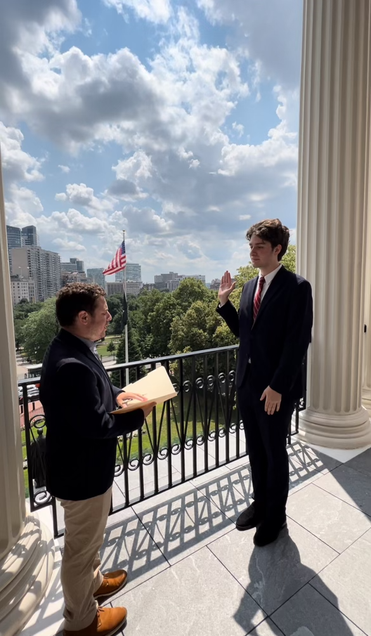 Yiannis’s experience as Chair of the SSAC and as student representative on the BESE Board has inspired him to pursue other public service opportunities. This past summer, Yiannis interned in the office of Senator Sal N. DiDomenico, Assistant Majority Leader in the State Senate, a contact he made through a BUA Transit Club outing to the State House to advocate for local transportation concerns. Of this experience, Yiannis says: “The connections I made leading out of the Transit Club outing were critical, opening doors to policymaking spaces I hadn’t imagined myself in before.” Building on this experience, Yiannis is currently writing his senior thesis on the housing crisis in Greater Boston. His research, informed by his work in Senator DiDomenico’s office, examines housing legislation at both the local and national levels, analyzing which policies have the greatest impact on affordability and accessibility.
Yiannis’s experience as Chair of the SSAC and as student representative on the BESE Board has inspired him to pursue other public service opportunities. This past summer, Yiannis interned in the office of Senator Sal N. DiDomenico, Assistant Majority Leader in the State Senate, a contact he made through a BUA Transit Club outing to the State House to advocate for local transportation concerns. Of this experience, Yiannis says: “The connections I made leading out of the Transit Club outing were critical, opening doors to policymaking spaces I hadn’t imagined myself in before.” Building on this experience, Yiannis is currently writing his senior thesis on the housing crisis in Greater Boston. His research, informed by his work in Senator DiDomenico’s office, examines housing legislation at both the local and national levels, analyzing which policies have the greatest impact on affordability and accessibility.
Reflecting on his advocacy work and a potential career in public service, Yiannis shares: “Massachusetts is known for being a leader in the educational sphere. But listening to public comments at BESE board meetings makes it clear that there’s still a lot of work to be done. Whatever I do in public policy, I want to make sure I’m actively bringing in stakeholders—that’s the overarching theme. I want to make sure that everyone feels seen and that their voices are heard.”
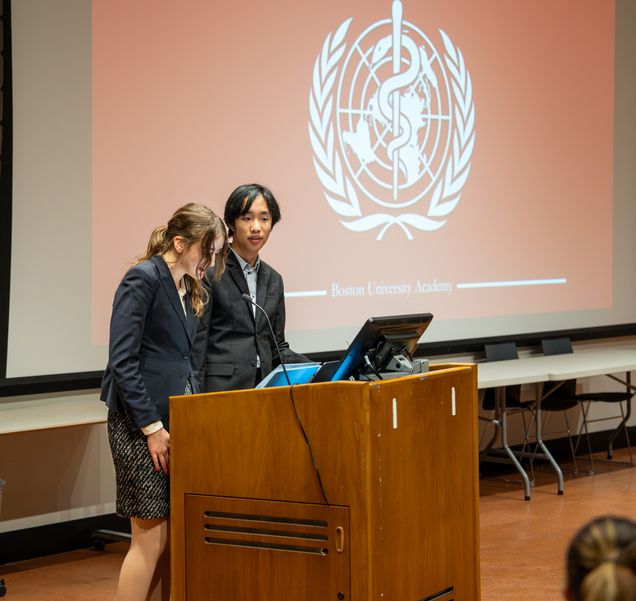
BUAMUN XIII
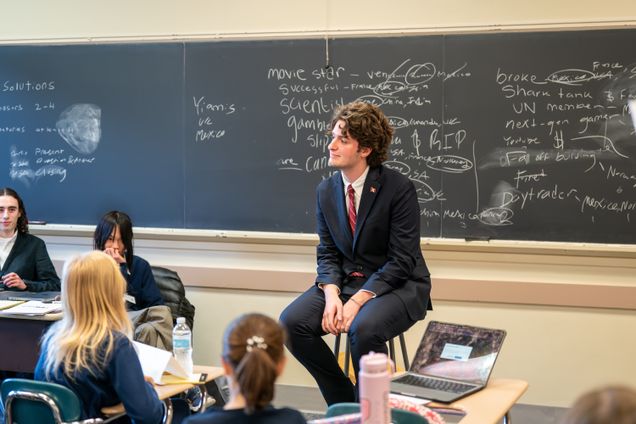 On February 1-2 , BUA hosted its 13th annual BUA Model UN conference for Boston-area middle schoolers, offering "a place for the next generation of diplomats to tackle real world problems, both past and present." Organized by Secretariat leaders Yiannis '25, Bella '25, Ryan '25 and Sofia '26, the conference welcomed over 150 middle school students representing delegations from more than a dozen local middle schools -- as well as from one school in Honduras! Scenarios ranged from Japan in the Commission on the Status of Women to Obi-Wan Kenobi in JCC: Star Wars. Click here to view photos from the event.
On February 1-2 , BUA hosted its 13th annual BUA Model UN conference for Boston-area middle schoolers, offering "a place for the next generation of diplomats to tackle real world problems, both past and present." Organized by Secretariat leaders Yiannis '25, Bella '25, Ryan '25 and Sofia '26, the conference welcomed over 150 middle school students representing delegations from more than a dozen local middle schools -- as well as from one school in Honduras! Scenarios ranged from Japan in the Commission on the Status of Women to Obi-Wan Kenobi in JCC: Star Wars. Click here to view photos from the event.

What You Do, Not Where You Go
I was talking with a BUA alumnus who is now well established in his career in the world of finance. We spent some time talking about hiring and the market for talent. At one point, he shared that his firm used to hire almost exclusively from the most highly selective colleges and universities in the country through on-campus recruiting programs. His firm stopped that practice recently. When I asked why, he explained that in part it was because they had been missing out on so many really strong applicants at the top of their classes at colleges outside that rarified set of schools, and that some of those applicants have turned out to be the rising stars at the firm. A look at the wide range of colleges that America’s top CEOs attended seems to confirm our alum’s observation.
Of course the country’s most selective institutions have a lot to offer and can be a great fit for some students. But what makes a college the right fit for a given student has vanishingly little to do with where a school falls on a ranking list and everything to do with how well that community matches the student. What kind of classmates do you learn best with? What kind of setting makes you happy and motivated? What do you want to study, and does the college have a particular strength in that area? Are there professors you would be excited to work with, labs you want to work in, archives you want to explore, clubs you want to join? We are so fortunate to have college counselors who take the time to get to know each student, help them discover what they are looking for, and work with them to identify colleges that could be a great fit.
And if you do find a great fit, it makes it much more likely that you will make the most of the experience. What does that look like? Excelling in rigorous coursework in a field you are passionate about. Refining your interests. Engaging in original research. Founding or leading a campus organization. Making deep connections with one or two professors who become mentors and advocates through graduate school and career. Making friends who will form a powerful network and support system for life. Those are the things that are the best predictors of fulfillment and success after college. After two decades working with high schoolers, I have seen that pattern play out many times over.
For more on this topic, I’d recommend Frank Bruni’s 2015 book “Where You Go Is Not Who You’ll Be” or his accompanying New York Times opinion piece, “How to Survive the College Admissions Madness” as good starting points.
Research Highlight: Siblings Mira Chu-Shore ’25 and Tai Chu-Shore ’26 Present at Biomedical Engineering Society Conference
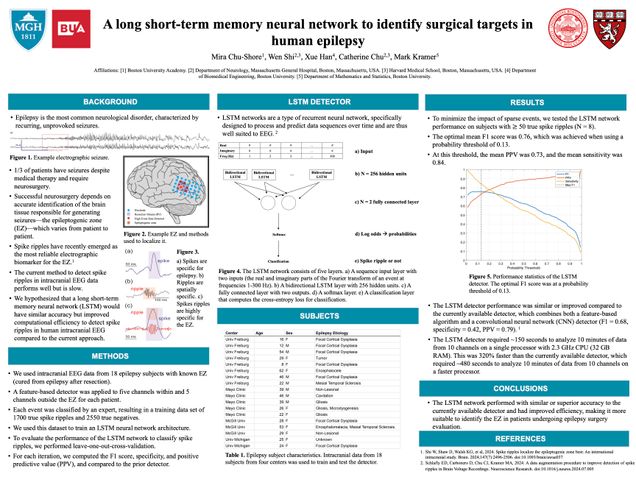 Last fall, siblings Mira Chu-Shore '25 and Tai Chu-Shore '26 presented at the annual Biomedical Engineering Society conference in Baltimore, MD, as part of the conference's two-hour poster session for high school students. Tai's poster, entitled "Blood Vessel Reflectance as a Tool for Assessing DBS Efficacy in Mice," focused on how blood vessels in mouse brains react to deep-brain stimulation while the mouse is still awake. Mira's poster, "A Long Short-Term Memory Neural Network to Identify Surgical Targets in Human Epilepsy," built upon her senior thesis research.
Last fall, siblings Mira Chu-Shore '25 and Tai Chu-Shore '26 presented at the annual Biomedical Engineering Society conference in Baltimore, MD, as part of the conference's two-hour poster session for high school students. Tai's poster, entitled "Blood Vessel Reflectance as a Tool for Assessing DBS Efficacy in Mice," focused on how blood vessels in mouse brains react to deep-brain stimulation while the mouse is still awake. Mira's poster, "A Long Short-Term Memory Neural Network to Identify Surgical Targets in Human Epilepsy," built upon her senior thesis research.
Of their experience at the conference and the path that led them there, Tai shared:

"From last summer until now, I have been visiting the Han Lab at BU and doing projects under two of the grad students working there. They told me about this conference and worked with me on creating the poster and practicing for the poster session. I told my sister about it, and she worked on creating a poster so she could also go. We both had to submit our research before getting in, including a basic outline of what we were going to prove and how. There were a lot of other people [at the conference], but I'm not quite sure how many, as I was presenting my poster the whole time."
Congratulations to Tai and Mira on your fascinating research and successful poster presentations!
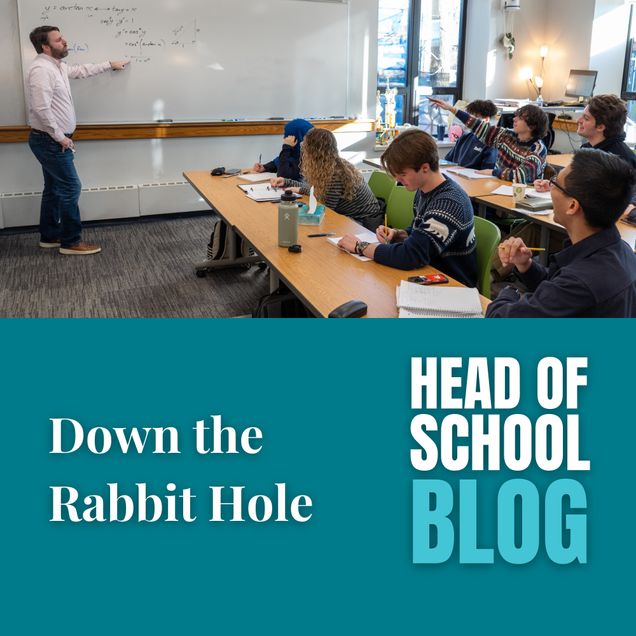
Down the Rabbit Hole
In a recent calculus class I visited, a student asked, “Can you have a function where you can take a first derivative but not a second derivative?” The question was related to the topic the class was discussing, but tangentially (excuse the pun). The teacher smiled, paused, and proceeded to write an example on the board where the proposition was true – taking time to unpack it for the whole class. The teacher had the knowledge to come up with an answer on the spot. He had the experience to know that he could get through the explanation quickly and still cover what was on tap for the day. And, most importantly, he recognized that engaging in that moment would reward that student’s curiosity and send a signal to all of the students about the value of their questions.
We are incredibly fortunate to be at a school with a faculty that has the disposition and content knowledge necessary to confidently and efficiently travel down the rabbit holes that our students open. I saw it recently in a Latin class where a student wondered about the placement of certain words in a sentence and the teacher explained the way long and short vowels may have met a poet’s rhythmic constraints; in a geometry classroom where the teacher engaged with a student who had a theory about the effect of moving from a five-sided to a six-sided star shape; in a music class, when, in response to a student’s question about how Spanish composers differed from their contemporaries, the teacher took the time to demonstrate the subtle differences on the piano and filled in the relevant music theory. I could go on.
Too often, high school is a place where even highly capable, motivated students lose their natural curiosity. That doesn’t have to happen. Curiosity can be – and has to be – nurtured. This is one way to do that.
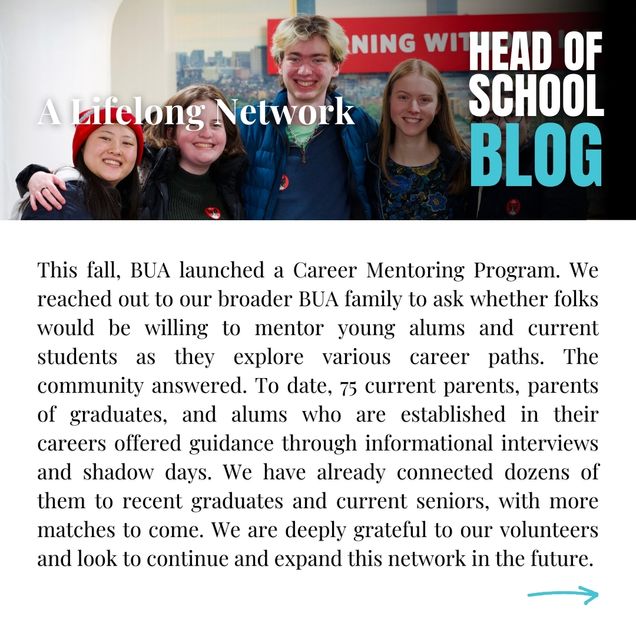
A Lifelong Network
This fall, BUA launched a Career Mentoring Program. We reached out to our broader BUA family to ask whether folks would be willing to mentor young alums and current students as they explore various career paths. The community answered. To date, 75 current parents, parents of graduates, and alums who are established in their careers offered guidance through informational interviews and shadow days. We have already connected dozens of them to recent graduates and current seniors, with more matches to come. We are deeply grateful to our volunteers and look to continue and expand this network in the future.
While some of our students and young alums can tap into their own professional networks through family and friends, many cannot. This program seeks to provide equitable access to career advice and mentorship across a broad range of fields. It gives the mentors another way to give back to a school community that, for many, has been transformational. And, for all, it will form connections and friendships, some of which will hopefully last for many years.
Reva Machanavajhula ’28 Selected For MA State Junior Golf Team
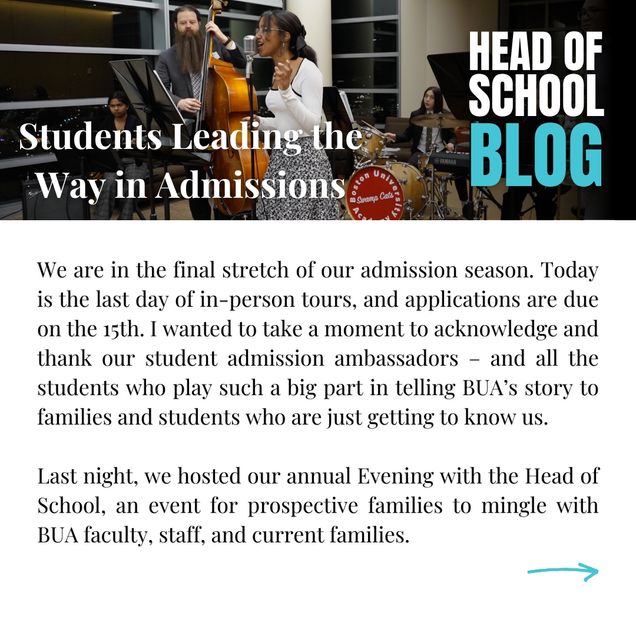
Students Leading the Way in Admissions
We are in the final stretch of our admission season. Today is the last day of in-person tours, and applications are due on the 15th. I wanted to take a moment to acknowledge and thank our student admission ambassadors – and all the students who play such a big part in telling BUA’s story to families and students who are just getting to know us.
Last night, we hosted our annual Evening with the Head of School, an event for prospective families to mingle with BUA faculty, staff, and current families. One common refrain I heard from our visitors was how amazing our students have been in the admission process – including last night. It was a cold one. Bundled up, BUA admission ambassadors were outside greeting visitors and helping them find their way to the event. That warm greeting on a frigid night made a real impression. I heard about how wonderful our student-led tours are – about the poise, humor, knowledge, maturity, and candor those tour guides demonstrate as they walk the halls with prospective families and students. I heard about how well our student speakers and panelists at our Open Houses represent themselves and the school – and about the signal it sends that we put students front and center this way, trusting them with roles sometimes reserved for adults in other schools. I heard from prospective families who were surprised that the live music at last night’s event was from our student select Jazz Combo – the Swamp Cats; about student volunteers at our Girl Power event and other admission events; and so much more.
Students, of course, are not the only ones who make our admission process so special. Parents, alums, faculty, and staff all play big roles. But it feels right to shine a light on the kids in this moment. To quote one parent from last night, “When you have kids like that, of course they should be the ones doing the talking. When we hear them, we know that this is the place for our son because we want him to be in school with kids like that.”
